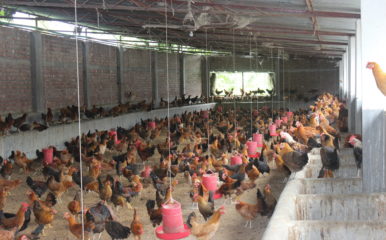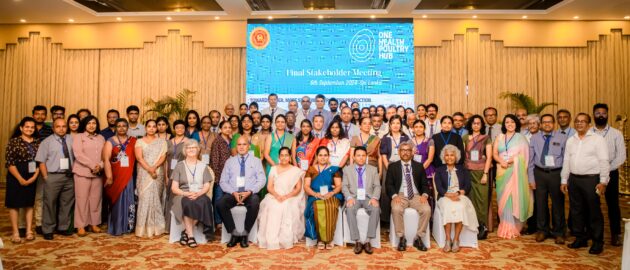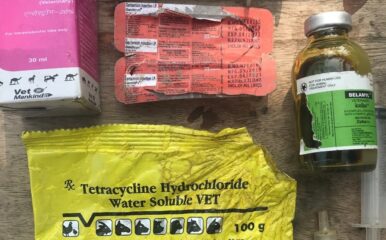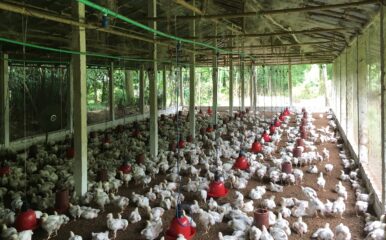
Bridging science, policy and industry: Reflections from a final stakeholder meeting
Published on 11/09/2024

Saalitha Karunarathna & Vindya Vasana
The Sri Lanka team of the GCRF One Health Poultry Hub held its final stakeholder meeting, marking the end of a significant chapter in Sri Lanka’s poultry industry but also signalling the beginning of a new era.
The event, held 6 September at the Mahaweli Hotel, Kandy, brought together experts, policymakers, academics and stakeholders from the poultry industry to reflect on achievements, discuss challenges and strategise future directions for safe and sustainable poultry production. It underscored the importance of addressing critical public health concerns while promoting sustainability in the poultry sector, and emphasised the role of research, policy engagement and capacity-building initiatives in ensuring the long-term health and productivity of the sector.
Through the meeting, the groundwork was laid for future collaborations to advance both poultry production and public health on a global scale.
Objectives and challenges
The inaugural session highlighted how far the Hub has come since its inception in 2019. The journey in Sri Lanka wasn’t without hurdles, including the disruptions caused by the COVID-19 pandemic and the national economic recession. Despite these obstacles, the Hub in Sri Lanka managed to achieve remarkable progress through strategic initiatives. It has been instrumental in boosting poultry exports, accrediting laboratories, providing training and developing awareness programmes, all of which has contributed to strengthening the poultry industry.
Professor Ruwani Kalupahana, National Coordinator of the Sri Lankan Hub, opened the session by discussing the project’s objectives, challenges and accomplishments, particularly how the deliverables were achieved using the Theory of Change tailored to the local context.
View the Sri Lanka team’s Theory of Change
Professor Anil Pushpakumara, Dean, Faculty of Veterinary Medicine and Animal Science, University of Peradeniya, emphasised the role of international collaborations, while Dr Palika Fernando, Additional Director General of the Department of Animal Production and Health, highlighted the benefits to both government and industry through direct and indirect support.
The Chief Guest, Professor Terrence Madhujith, Vice-Chancellor of the University of Peradeniya, commended the growth of Sri Lanka’s poultry sector, focusing on the importance of poultry production for food security and nutrition. He pointed out the resurgence of backyard poultry farming, its role in empowering women and the critical insights gained from the Hub’s mapping of the country’s poultry distribution networks.
Professor Ayona Silva-Fletcher Professor of Veterinary Education, Royal Veterinary College, UK, underscored the need for collaboration between natural and social scientists to address the complex challenges facing the poultry industry. Adding to this, Professor Robyn Alders, Senior Consulting Fellow, Global Health Programme, Chatham House, UK, emphasised the importance of a supportive policy environment, essential for facilitating safe and sustainable poultry production and associated value chains.
Biosecurity and gender
During the scientific session ‘People, Poultry and Production,’ key presentations shed light on the complexities of poultry farming in Sri Lanka. Dr Palika Fernando’s presentation highlighted critical nodes in Sri Lanka’s poultry distribution network that heighten the risk of disease transmission and importance of biosecurity measures tailored to each production system, including backyard systems.
Dr Poornika Seelagama’s study on the broiler poultry sector revealed how informal norms often override formal biosecurity regulations, underscoring the need for stricter monitoring.
A gender-focused study also explored the significant role women play in rural backyard poultry farming, especially in the Northern province, their significant role in farm management and the heightened health risks women face due to limited access to safety measures and reliance on traditional medicine.
Surveillance and accreditation
During the scientific session ‘Host-Pathogen Dynamics’, a key presentation from Dr Roshan Madalagama focused on the significant role of foodborne pathogens in the poultry industry. He highlighted the risks posed by pathogens such as Salmonella, Campylobacter, and E. coli along the poultry value chain, from farm to fork.
Dr Madalagama emphasised the importance of mitigating these risks through improved hygiene practices and monitoring cross-contamination in the production process. The study also underscored the presence of antimicrobial residues in poultry, adding to the challenge of ensuring food safety.
A major accomplishment discussed was the initiation of laboratory accreditation under ISO 17025 standards. This aims to improve foodborne pathogen surveillance in Sri Lanka and the accreditation will play a crucial role in ensuring the export readiness of poultry products while also enhancing national food safety standards.
Policy discussions
During the scientific session on policy mapping and development, Dr Chamari Kannangara presented a comprehensive overview of mapping existing poultry industry-related policies and the development of a National Poultry Policy for Sri Lanka. Dr Kannangara emphasised the critical role animal husbandry policies play in shaping and regulating the poultry industry, noting that no previous studies had been conducted to map all the relevant policies in Sri Lanka.
Through an open-source actor and policy mapping tool, over 20 documents from various institutions, including the Ministry of Agriculture, the Department of Animal Production and Health and the Ministry of Health, were analysed. The policy mapping process identified gaps in existing regulations and highlighted the need for a separate, updated poultry policy to support sustainable and competitive industry development.
Moving forward, the drafted National Poultry Policy is already publicly accessible for public comments, with the final National Poultry Policy set to be submitted for government approval. A key takeaway from the policy discussions was the importance of integrating evidence-based research into policymaking. By addressing gaps in biosecurity, disease control, and sustainable production practices, policymakers can create a more resilient poultry industry that contributes to food security and public health in Sri Lanka.
A presentation by Dr M. Ijas explored the potential for reviving Sri Lanka’s poultry export sector, focusing on the country’s status as free of high pathogenic avian influenza (HPAI). The session highlighted the need for better communication between government bodies and commercial producers, alongside technical training and regulatory enhancements to meet international market standards, paving the way for increased export opportunities.
Livelihoods and sustainability
The panel discussion at the meeting brought forth critical insights into how to balance economic development and sustainability in the poultry sector. Dr Poornika emphasised the need to focus on grassroots-level communities, underscoring that no country can progress by ignoring its people, particularly those in rural areas.
Panellists discussed the importance of public and private sector support to facilitate both backyard poultry farming and large-scale commercial operations to lift up the livelihoods of rural farmers, particularly during difficult economic times. Dr Madura pointed out that when poultry prices rise by 50% or more it places a significant strain on low-income households, but backyard poultry farming could serve as a buffer, allowing these families to continue accessing affordable protein sources.
The discussion also covered the role of government and extension services in supporting the poultry industry, especially in educating rural farmers about biosecurity and disease control measures. Dr Palika highlighted the need to reduce foodborne pathogens by improving enhancing research and strengthening biosecurity measures in poultry production. She also pointed out that providing proper guidelines and training to rural communities is essential, though difficult, especially from a sociological perspective.
The panellists stressed the importance of expanding Sri Lanka’s poultry exports while ensuring that the necessary infrastructure and facilities are in place to meet international standards. Panellists collectively agreed on the need for further research into improving disease control, enhancing export potential and supporting small-scale farmers.
The discussion concluded with a call for continued collaboration between government, researchers and the private sector to drive the future growth and sustainability of Sri Lanka’s poultry industry.
Research and policy directions
The stakeholder meeting underscored the importance of continued research and policy engagement. As Sri Lanka seeks to expand its poultry export market, there is a growing need for the implementation of internationally recognised food safety and biosecurity standards.
The ongoing development of a national poultry policy, informed by extensive mapping of existing policies, will be a critical step in this direction. With the increasing threat of zoonotic diseases and antimicrobial resistance, Sri Lanka’s poultry industry must continue to innovate. The Hub’s emphasis on interdisciplinary research—bridging veterinary science, agriculture, sociology and public health—will be instrumental in shaping future research agendas. Notably, findings on pathogen diversity and lab accreditation efforts have already laid the groundwork for improved health outcomes in both animals and humans.
By fostering collaboration, improving biosecurity, and addressing policy gaps, the Hub has created a pathway for sustainable growth in the sector. The final stakeholder meeting was both a celebration of these achievements and a call to action for future research and policy development. As Sri Lanka moves forward, it will be crucial to continue building on these successes, ensuring that the poultry industry remains a cornerstone of both economic growth and food security.


